Magazine
CfP: The Dark Side: A Supervillain Reader
CfP: Drawing out the Shadows: Responses to the Holocaust in Graphic Narratives
CfP: Michigan State University Comics Forum 2017
Duckburg – Exhibition in Oberhausen
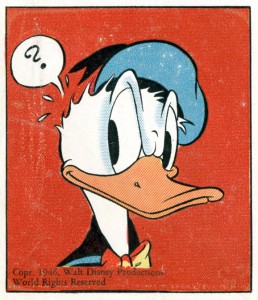
MONITOR: NEW PUBLICATIONS ON COMIC BOOKS
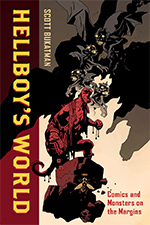
Hellboy’s World:
Comics and Monsters on the Margins
Scott Bukatman
University of California Press
280 pages
ISBN 978-0-5202-8804-1 (Paperback)
~$ 24,95
April 2016
Publisher’s page
Hellboy, Mike Mignola’s famed comic book demon hunter, wanders through a haunting and horrific world steeped in the history of weird fictions and wide-ranging folklores. Hellboy’s World shows how our engagement with Hellboy’s world is a highly aestheticized encounter with comics and their materiality. Scott Bukatman’s dynamic study explores how comics produce a heightened “adventure of reading” in which syntheses of image and word, image sequences, and serial narratives create compelling worlds for the reader’s imagination to inhabit. Drawing upon other media—including children’s books, sculpture, pulp fiction, cinema, graphic design, painting, and illuminated manuscripts—Bukatman reveals the mechanics of creating a world on the page. He also demonstrates the pleasurable and multiple complexities of the reader’s experience, invoking the riotous colors of comics that elude rationality and control and delving into shared fictional universes and occult detection, the horror genre and the evocation of the sublime, and the place of abstraction in Mignola’s art. Monsters populate the world of Hellboy comics, but Bukatman argues that comics are themselves little monsters, unruly sites of sensory and cognitive pleasures that exist, happily, on the margins. The book is not only a treat for Hellboy fans, but it will entice anyone interested in the medium of comics and the art of reading.
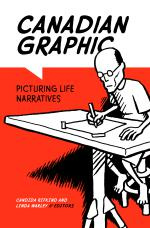
Canadian Graphic:
Picturing Life Narratives:
Candida Rifkind and Linda Warley (eds.)
WLU Press
320 pages
ISBN 978-1-77112-179-8 (Paperback)
~$ 29,99
May 2016
Publisher’s page
Canadian Graphic: Picturing Life Narratives presents critical essays on contemporary Canadian e role of graphic life narratives in reimagining the national past, including Indigenous–settler relations, both world wars, and Quebec’s Quiet Revolution.
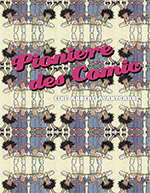
Pioniere des Comic:
Eine andere Avantgarde
Alexander Braun, Max Hollein, and David Currier (eds.)
Hatje Cantz Verlag
256 pages
ISBN 978-3-7757-4110-1
~€ 35,00
June 2016
Publisher’s page
Comics entstanden um 1897 in Form von farbigen Sonntagsbeilagen in den großen amerikanischen Tageszeitungen. Sie erreichten als erstes bebildertes Massenmedium zig Millionen Leser pro Tag und setzten sich sofort an die Spitze der Unterhaltungsindustrie. Lange wurde übersehen, wie innovativ und experimentell die frühen Comic-Pioniere waren und dass sich ihre Arbeiten häufig auf Augenhöhe mit der künstlerischen Avantgarde der Zeit befanden. Winsor McCay nahm ab 1905 den Surrealismus vorweg, so wie George Herriman in Krazy Kat ab 1913 Aspekte des Absurden Theaters etablierte. Cliff Sterretts Szenarien der späten 1920er-Jahre erinnern an expressionistische Stummfilme, während Frank O. King mit Gasoline Alley das Erzählen in Echtzeit probierte. Lyonel Feininger nicht zu vergessen, der 1906/07 mit zwei Comicserien seinen Weg zur künstlerischen Unabhängigkeit beschritt.
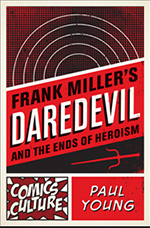
Frank Miller’s Daredevil and the Ends of Heroism
Paul Young
Rutgers University Press
256 pages
ISBN 978-0-8135-6381-7 (Paperback)
~$ 27,95
June 2016
Publisher’s page
In the late 1970s and early 1980s, writer-artist Frank Miller turned Daredevil from a tepid-selling comic into an industry-wide success story, doubling its sales within three years. Lawyer by day and costumed vigilante by night, the character of Daredevil was the perfect vehicle for the explorations of heroic ideals and violence that would come to define Miller’s work. Frank Miller’s Daredevil and the Ends of Heroism is both a rigorous study of Miller’s artistic influences and innovations and a reflection on how his visionary work on Daredevil impacted generations of comics publishers, creators, and fans. Paul Young explores the accomplishments of Miller the writer, who fused hardboiled crime stories with superhero comics, while reimagining Kingpin (a classic Spider-Man nemesis), recuperating the half-baked villain Bullseye, and inventing a completely new kind of Daredevil villain in Elektra. Yet, he also offers a vivid appreciation of the indelible panels drawn by Miller the artist, taking a fresh look at his distinctive page layouts and lines.
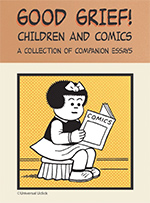
Good Grief! Children and Comics: A Collection of Companion Essays
Michelle Ann Abate and Joe Sutliff Sanders (eds.)
The Ohio State University Libraries
141 pages
DOI: 10.18061/1811/77539
Free Access
June 2016
Publisher’s page
With original essays examining everything from Little Nemo to Calvin and Hobbes, from Batman to the Lumberjanes, from Bone to Maus, this collection of companion essays is your online introduction to the larger questions and contexts of the groundbreaking new exhibit at the Billy Ireland Cartoon Library and Museum (part of the Ohio State University Libraries).
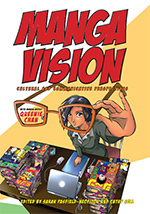
Manga Vision:
Cultural and Communicative Perspectives
Sarah Pasfield-Neofitou and Cathy Sell (eds.), art by Queenie Chan
Monash University Publishing
302 pages
ISBN 978-1-925377-06-4 (Paperback)
~$ 49,95
June 2016
Publisher’s page
Manga Vision examines cultural and communicative aspects of Japanese comics, drawing together scholars from Japan, Australia and Europe working in areas as diverse as cultural studies, linguistics, education, music, art, anthropology, and translation, to explore the influence of manga in Japan and worldwide via translation, OEL manga and fan engagement. The volume includes a mix of theoretical, methodological, empirical and professional practice-based chapters, examining manga from both academic and artistic perspectives. Manga Vision also provides the reader with a multimedia experience, featuring original artwork by Australian manga artist Queenie Chan, cosplay photographs, and an online supplement offering musical compositions inspired by manga, and downloadable manga-related teaching resources.
Special Journal-Issue “Mediality and Materiality of Contemporary Comics”
On August 16, a special-themed issue of the Journal of Graphic Novels and Comics (7.3)
has been published on the topic “Mediality and Materiality of Contemporary Comics”.
The issue is based on the Workshop of the same name, organzied by the Comics Studies Working Group (AG Comicforschung) of the German Society for Media Studies (Gesellschaft für Medienwissenschaft) that took place from April 24-26, 2015, at the University of Tübingen (an English conference report was given by Christian A. Bachmann and Stephan Packard).
Additional contributions are based on the Tübingen Winter Schools “Transmedial Worlds in Convergent Media Culture” (February 24-28, 2014) and “Transmedial Narratology: Theories and Methods” (February 23-26, 2016).
Not only the guest editors Jan-Noël Thon and Lukas R.A. Wilde are members of ComFor but also some of the contributors, Christina Meyer, Daniel Stein and Markus Oppolzer.
Table of Contents:
Introduction: mediality and materiality of contemporary comics
Jan-Noël Thon / Lukas R.A. Wilde
Understanding comics’ mediality as an actor-network: some elements of translation in the works of Brian Fies and Dylan Horrocks
Sebastian Bartosch
‘Posing for all the characters in the book’: the multimodal processes of production in Alison Bechdel’s relational autobiography ‘Are You My Mother?’
Anne Rüggemeier
Reaching an audience: the publication history of David Hine’s ‘Strange Embrace’
Markus Oppolzer
‘Mummified objects’: superhero comics in the digital age
Daniel Stein
Medial transgressions: comics – sheet music – theatre – toys
Christina Meyer
Wandering the panels, walking through media: zombies, comics, and the post-apocalyptic world
Bernard Perron
Programme of the Kiel Comic Conference “Beginnings and Renewals in Comics”
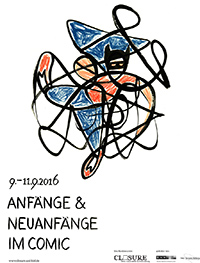
Organised by the editorial team of CLOSURE, Kiel University’s e-journal for comics studies, Kiel’s first comic conference will be held from the 9th to the 11th of September 2016 at the University of Kiel. The conference focuses on ›Beginnings‹ and ›Renewals‹ in comics and takes into account both formal and historical aspects of the genre. The conference explicitly seeks to approach this topic from an interdisciplinary perspective.
Panels consist of 11 papers delivered by international comics scholars, a keynote address by Silke Horstkotte, and a concluding panel discussion. On Friday night, the conference opens with a comic book reading at the art gallery in Kiel. Four comic book artists – Tanja Esch from Hamburg, Jul Gordon and Sascha Hommer (»Kontaktcenter Hamburg«) and Gregor Hinz (comic magazine »Pure Fruit«) – read from their respective works, thereby approaching the topics of Beginnings and Renewals from a performative perspective. Presentations and the comic book reading are free of charge and open to university members as well as to the general public.
Attending the conference is free of charge and open to the public. Lectures will be given partly in English and partly in German
On the conference’s topic:
“On your marks! More than any other narrative field, graphic storytelling is determined by beginnings. Case in point: 2012 saw the newest in a long line of reboots, as DC comics renumbered and restarted its series and its universe. It is not just the context of serial superhero stories, however, that is characterized by ›beginnings‹ and ›renewals‹ – any historical perspective requires both comics and comics studies to re-examine the question of beginnings.
The conference, held on September 9-11, 2016 in Kiel, Germany, will focus on the themes of ›beginning‹ and ›renewal‹ in comics, seeking a wide range of interdisciplinary approaches to the question of what constitutes a new start in comics and for comics. This includes ›beginning‹ as a formal device as well as related inquiries into the narratological, stylistic and theoretical implications of beginnings within the structure of comics. Further approaches include the question of beginnings of the medium, its discourses and the study of comics. Last but not least: ›beginnings‹, ›renewals‹ and ›fresh starts‹ will also be analyzed as themes and motifs.”
Programme:
Location: Kunsthalle zu Kiel, Düsternbrooker Weg 1, 24105 Kiel
| Friday, 09 Sep 2016 | |
| 17:30–18:15 h | Registration |
| 18:30–19:30 h | Welcome and Reception |
| 20:00–21:30 h | Comic Reading at the Kunsthalle Details Details |
Location: Kiel University, Leibnizstraße 1 (room 204), 24118 Kiel
| Saturday, 10 Sep 2016 | |
| 09:15–09:45 h | Conference Opening and Short Introduction |
| Panel 1 | |
| 09:45–10:30 h | Joachim Jordan (Berlin, Germany): The Sleepless Nights of Major Stefanov. Uncertain, Endless Beginnings in the Bulgarian Comic of the Eighties. |
| 10:30–11:15 h | Carmela Artime Omil (Barcelona, Spain): Claiming Truth: Beginnings in Spanish Graphic Novels on the Civil War (2005-2015) |
| 11:15–11:30 h | Break |
| Panel 2 | |
| 11:30–12:15 h | Paul M. Malone (Waterloo, Canada): Werbecomics at the Beginning of German Comics |
| 12:15–13:00 h | Camilla Murgia (Geneva, Switzerland): Speech Balloons, Bubbles and Captions: the Rise of Narrative in 18th-Century British Comics |
| 13:00–14:00 h | Lunch Break |
| Panel 3 | |
| 14:00–14:45 h | Janek Scholz (Aachen, Germany): Game Over and Reset. Serielle Neuanfänge im Comic Daytripper von Fábio Moon und Gabriel Bá |
| 14:45–15:30 h | David Turgay (Wörth, Germany): First Page, First Issue, New Volume: Starting a Character Again and Again |
| 15:30–16:15 h | Annina Klappert (Erfurt, Germany): Anders anfangen. Building Stories von Chris Ware |
| 16:15–16:45 h | Break |
| 16:45–17:45 h | Keynote: Silke Horstkotte (Warwick, UK): Textanfänge, Weltanfänge. Peer Meters Serienmörder-Trilogie |
| 17:45–18:15 h | Break |
| 18:30–open end | Conference Dinner |
| Sunday, 11 Sep 2016 | |
| Panel 4 | |
| 09:30–10:15 h | Lukas R. A. Wilde (Tübingen, Germany): On the Contemporary ›Mangaization‹ of Japanese Public Spaces: the Base-Narrativity of Manga-Pictoriality |
| 10:15–11:00 h | Jasmin Böschen (Hamburg, Germany): Neuanfang in der Wissenschaft? Comic als Initiator für Visuelle Bildung |
| 11:00–11:15 h | Break |
| Panel 5 | |
| 11:15–12:00 h | Pascal Lefèvre (Brussels, Belgium): Publication Format and Beginnings |
| 12:00–12:45 h | Bettina Egger (Salzburg, Austria): Aesthetics of Polemics: L’Association and the Transformation of the Comic Book in the 1990s |
| 12:45–13:15 h | Break |
| 13:15–14:00 h | Closing Discussion |
| 14:00 h | Farewell |
Contact:
closure@comicforschung.uni-kiel.de
The Bonn Online Bibliography is up to 10,000 entries

Last weekend the Bonn Online Bibliography for Comics Research has arrived at the mark of 10,000 entries and meanwhile gotten beyond this milestone. The free of charge accessible database is collecting scholarly works about all aspects of comics and lets the user research them in numerous ways, through search masks, a keyword catalogue and cross-linking of all the entries. The ComFor is sponsoring the bibliography regularly to carry on its progress. We’d like to congratulate Joachim Trinkwitz to this succcess, who has been overseeing the project since its beginnings in 2008, and we’d also like to express our gratitude for his tireless dedication.
Continue to the Bonn Online Bibliography for Comics Research
